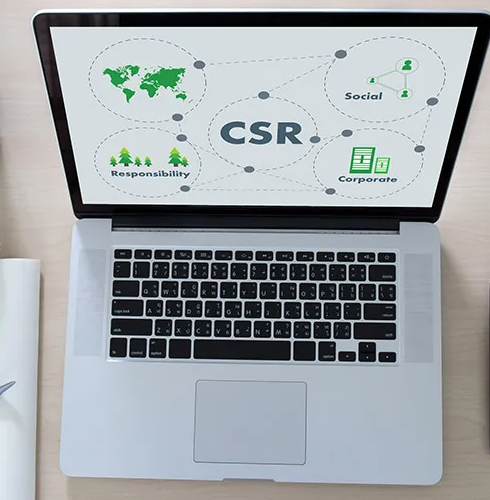Corporate Social Responsibility (CSR) is now a core component of modern business strategies. Companies are no longer solely focused on profit generation; they are increasingly held accountable for their social, environmental, and ethical impacts. As businesses strive to meet these expectations, the demand for CSR professionals is growing. Becoming certified in CSR is an excellent way to enhance your career while making a meaningful difference in the corporate world. If you’re interested in pursuing CSR certification, this guide will walk you through the essential steps.
The Importance of CSR in Today’s Corporate Landscape
Corporate Social Responsibility has evolved from a niche practice to a mainstream business function. Companies are expected to operate transparently and responsibly, balancing profit with a positive social and environmental impact. CSR professionals play a pivotal role in ensuring that companies align their business models with sustainability goals, ethical standards, and community engagement.
By integrating CSR into their operations, businesses can build stronger relationships with stakeholders, increase consumer trust, and improve long-term profitability. A career in CSR allows you to engage with meaningful causes while working within the business sphere, helping shape better corporate practices and contributing to a sustainable future.
Exploring CSR Certification Programs
Before committing to a CSR certification, it’s essential to research the various options available. Certification programs differ in focus, ranging from environmental sustainability to ethical governance and community engagement. Some certifications are offered through universities and academic institutions, while others are provided by professional organizations and online platforms.
Popular certifications include ISO 26000, the Global Reporting Initiative (GRI), and those from organizations like the Institute of Corporate Responsibility and Sustainability (ICRS). When choosing a program, consider factors such as the course content, duration, assessment methods, and industry recognition. It’s also helpful to speak with professionals who have completed the certification to gain insights into the program’s value and relevance to your career goals.
Meeting Eligibility Requirements
Most CSR certification programs do not require a specific undergraduate degree, though a background in business, environmental science, or law can be beneficial. Entry-level certifications are often accessible to professionals with limited CSR experience, while advanced certifications may require several years of relevant work.
Experience in fields such as sustainability reporting, community engagement, public policy, or compliance can enhance your eligibility and enrich your learning journey. Volunteering or participating in CSR activities within your current role can also strengthen your application and demonstrate your commitment to social responsibility.
Immersing Yourself in CSR Coursework
Upon enrollment in a CSR certification program, you will dive into topics such as social accountability, environmental impact, governance, and stakeholder analysis. The coursework typically combines theoretical learning with practical applications, equipping you with the skills needed to develop CSR strategies and measure their effectiveness.
Many programs use case studies from corporations, non-profits, and governmental bodies to illustrate how CSR initiatives work across different sectors. Participating in group discussions, workshops, and peer reviews will also help you sharpen your communication and problem-solving skills. By engaging actively with the coursework, you’ll be well-prepared to implement CSR strategies in real-world contexts.
Completing the Certification Assessment
Most CSR certification programs conclude with an exam, project submission, or comprehensive assessment of your knowledge. This evaluation tests your understanding of various CSR topics, such as regulatory compliance, sustainability measures, and ethical practices.
To prepare for the assessment, review the course materials thoroughly, stay updated on CSR trends, and engage with practice case studies or mock tests. Joining study groups or attending webinars offered by the program provider can further enhance your understanding of complex topics. Once you’ve passed the exam or completed the required project, you’ll receive your certification, which serves as official recognition of your expertise in CSR.
Leveraging CSR Certification for Career Advancement
Obtaining CSR certification opens the door to numerous career opportunities. It not only validates your knowledge and skills but also signals to employers that you are committed to ethical practices and sustainability. With this certification, you’ll be better positioned to pursue roles such as sustainability officer, social impact consultant, ESG analyst, or supply chain ethics coordinator.
For those already working in corporate settings, CSR certification can support a shift into CSR-focused departments or a hybrid role that integrates CSR with other business functions. Alternatively, you may explore opportunities with NGOs, public agencies, or think tanks, where CSR expertise is critical for policy development, program evaluation, and public-private sector partnerships.
CSR certification is not just a career asset; it’s also a reflection of your personal commitment to creating a positive impact. As businesses face increasing scrutiny and rising expectations from stakeholders, CSR professionals are essential in guiding organizations toward more ethical, sustainable practices.
Conclusion
Pursuing a career in Corporate Social Responsibility through certification offers a structured pathway to making a lasting impact in today’s business world. Whether you’re just starting or looking to deepen your expertise, CSR certification provides the knowledge and recognition needed to drive change in organizations while advancing your career. By understanding and applying CSR principles, you’ll help shape a future where business success and social responsibility go hand in hand.



